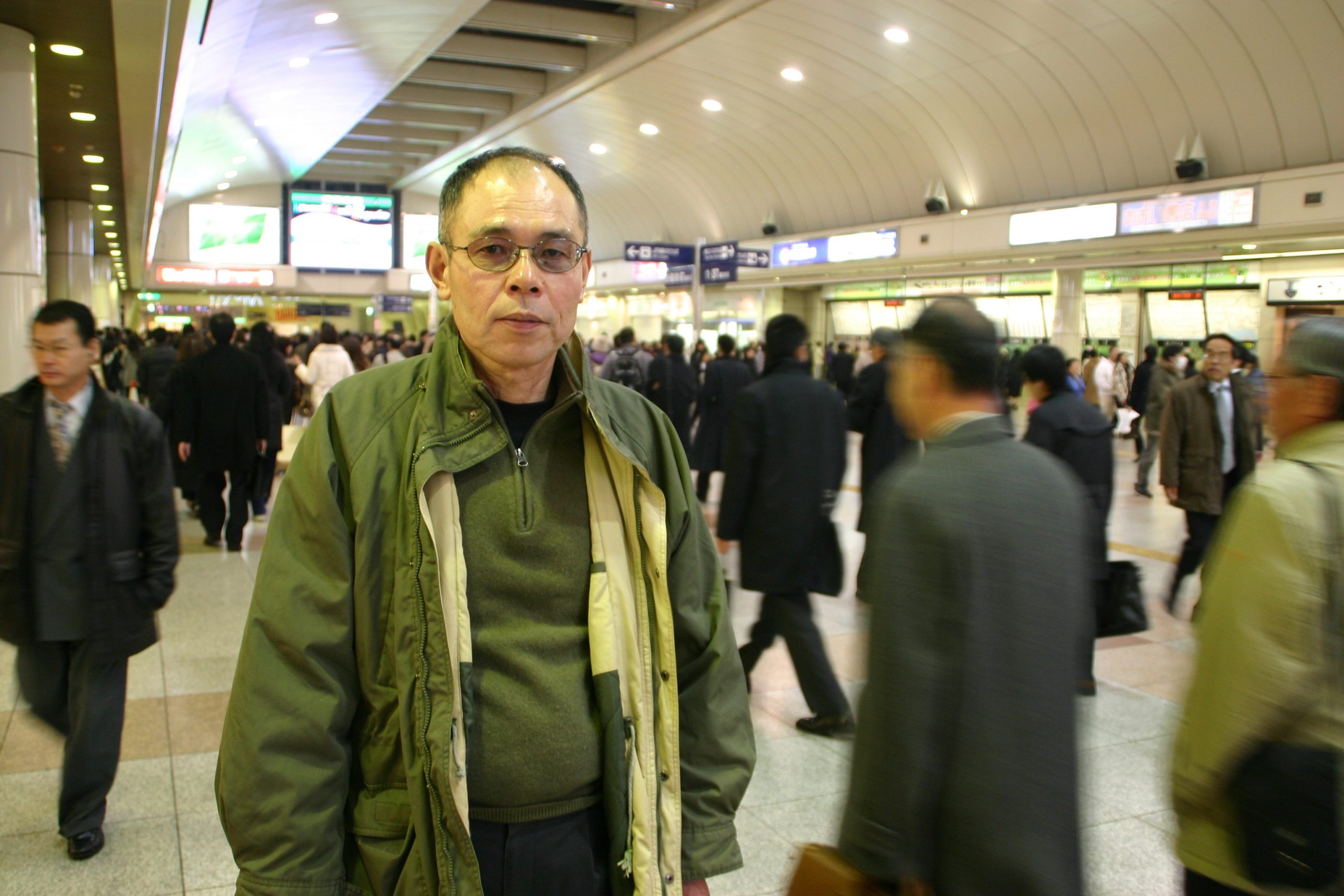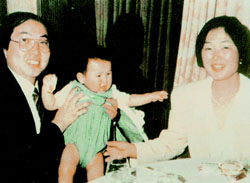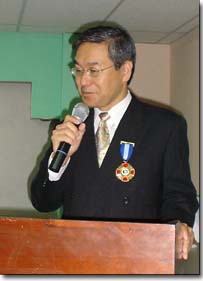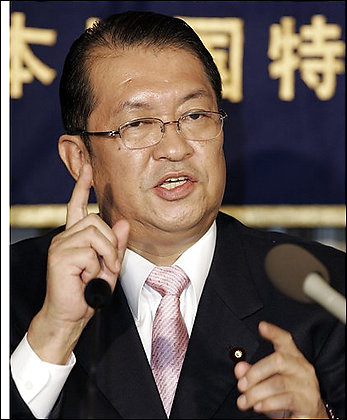David McNeill
Japan’s unique system of detention, interrogation and trial was recently subjected to withering criticism by the UN. Will anything change?
Even in a culture that frowns on displays of extreme emotion, Yanagihara Hiroshi cannot suppress his rage. The state falsely accused him of rape, imprisoned him for two years then freed him with the odd words of Judge Fujita Satoshi ringing in his years. “I hope the rest of his life will be meaningful,” said Fujita following a rare retrial at Takaoka Branch of Toyama District Court. While languishing in Fukui Prison, Yanagihara lost his job and his father, who died alone. “The judge’s ‘not-my-problem attitude’ made me sick,” Yanagihara said after the verdict.
In April 2002, following two rape incidents in Himi, Toyama Prefecture, the then 40-year-old taxi driver was picked from a set of photos by one of the victims after a colleague at his taxi company contacted police to say that an artist’s impression of the suspect they had released appeared to resemble Yanagihara.
Convinced they had their man, the police ignored the lack of supporting evidence and pressed hard for a confession. Yanagihara had a plausible alibi, left no fingerprints and wore shoes several sizes smaller than the footprints left behind by the rapist. But after three days in custody during which police reportedly used a photograph of his dead mother to shame him, Yanagihara “confessed.” Despite later retracting (then accepting) his statement, he was sentenced to three years imprisonment in Nov. 2002. He was exonerated by Judge Fujita last October only after the real rapist confessed.
Yanagihara was luckier than Sugiyama Takao, who spent 29 years in prison for a robbery/murder he says he didn’t commit. Now free on conditional release, the 60-year-old must notify the police of every major life change and will return to jail until he dies if he commits another crime. Last year, he had to apply to both the justice and foreign ministries for special permission to leave the country and speak to the United Nations in Geneva, Switzerland about the system of detention and trial that robbed him of half his life. “The people I talked to in Switzerland taught me a little English,” he recalls, laughing bitterly at the memory. “Crazy Japan.”
Substitute prisons
The UN’s Committee on Torture unleashed withering criticism of Japan’s treatment of people under arrest in official comments published in 2007, singling out the extended detention of suspects in local jails. Known as daiyo kangoku (substitute prisons), the practice allows detectives to detain suspects in police cells. Interrogations and detentions last up to 23 days prior to indictment and, in extreme cases can stretch into many months in what some critics have called “pre-trial punishment.” Forced signed confessions are often the result, say the system’s critics.
Detention in police jails (rather than separate detention facilities controlled not by the police, but by the Ministry of Justice) “coupled with insufficient procedural guarantees for the detention and interrogation of detainees, increases the possibilities of abuse of their rights, and may lead to a de facto non respect of the principles of presumption of innocence, right to silence and right of defense,” said the Committee.  In other words, the police can ignore the most basic legal protections of the Constitution. The Justice Ministry called the Committee’s dismal report card “disappointing.”
Those UN comments echo earlier reports by the Japan Bar Association, Human Rights Watch, the International Bar Association and other UN panels that say Japan’s treatment of criminal suspects is unfair and leads to coerced confessions. In about 99% of criminal trials, defendants are found guilty, and in the bulk of cases, the defendant has confessed to charges. Lawyers are not allowed to be present during interrogations, either before or after indictment. Suspects often allege psychological and sometimes physical abuse.
Critics acknowledge that the police are mostly thorough, the legal machine functions efficiently in the majority of cases and that ultimately Japan incarcerates people at a far lower rate than most developed countries. But they say the damning UN report has finally focused minds here on something known by defense lawyers for years: the system is open to horrendous abuse.
That system recently came under brief but intense scrutiny during a bizarre case of alleged vote buying in Kagoshima, Kyushu, after police arrested and falsely accused 13 men and women of rigging a local election. Pages of elaborately detailed and completely fabricated confessions were produced in court, the product of “marathon” interrogation sessions, according to presiding judge Tani Toshiyuki, who tossed them out and acquitted the defendants. Nakayama Shinichi (61), the politician accused of plying voters with 1.91 million yen in cash and booze, says he still cannot believe what happened.
“I was tempted to admit the charge only once, when chief detective Isobe (Nobukazu) told me that my wife had owned up,” recalls Nakayama, who spent 395 days in jail (his wife was held in a separate station and released after 273 days). Nakayama says he went to the local police station voluntarily but was then taken for interrogation to Kagoshima, protesting his innocence all the way. “The detective said, ‘If you admit the crime, we’ll release your wife straight away.’ I considered her health and actually said ‘Yes, I did it.’” But during a lunchtime chat with his lawyer, he discovered the police were lying. I was weaker than my wife. After our release, I was so grateful to her.” One defendant died during the ordeal and another tried to commit suicide.
Nakayama was awarded 12,500 yen for every day he spent in jail, but says only an impartial investigation into police procedures and the background to the case will compensate. So far, and despite a collective legal campaign by the former defendants, that investigation has stalled. Inspector Isobe was admonished, another officer suffered a three-month salary cut; the station chief was let off with a warning.
Defense lawyers in Yanagihara’s Toyama rape retrial fared worse. Demands that the police be asked to explain their conduct were rejected by the judge, “destroying” (said The Japan Times) any hope of examining the background or making sure that his was the last such case.
Hostage Justice
Lawyers use the term hitojichi shiho (“hostage justice”) to describe the Catch-22 faced by arrestees in Japan. Resisting police demands for a confession and denying the charges results in detention for extended periods; confession brings quick release.
Sugiyama claims he and his fellow accused, Sakurai Shoji, who confessed to robbing and killing an Ibaraki pensioner in 1967 after 20 days in detention, were victims of hostage justice. “The cops just kept on and on, and eventually I threw my hands up and confessed,” he explained. “I thought the courts would understand that there was no evidence to convict us. I had no idea.”
Released on parole in 1996, Sugiyama’s petition for a retrial was accepted by a District Court in 2005 but immediately challenged by the prosecution and is now being heard in the Tokyo High Court. “I’ll keep fighting until I die,” he says.
Most worryingly of all, say critics, lawyers – the last line of defense in this potholed legal landscape – are not immune from harassment. Tokyo lawyer Yasuda Yoshihiro was arrested in 1998 and held for 300 days while he was tried on charges of unlawfully concealing the assets of a client. Yasuda was no friend of the police: he had defended Asahara Shoko, leader of the murderous religious cult Aum Shinrikyo and is Japan’s most outspoken critic of the death penalty. During the Aum trial, the lawyer accused the police of failing to properly investigate the Aum-sanctioned murder of lawyer Sakamoto Tsutsumi and his family, because he sided against them in the alleged wiretapping of Communist Party members.
In 2003, the Tokyo District Court found him not guilty, criticizing the prosecutors as “unfair,” but Yasuda remains furious at his detention and interrogation. “How can we achieve the principle of presumption of innocence in Japan under such circumstances?” he asked The Japan Times after his release. Says Lawrence Repeta, a constitutional specialist at Tokyo’s Omiya Law School: “The point of what they did to him is to threaten every lawyer in Japan. The authorities are saying to lawyers, ‘back off, don’t aggressively represent your client or we are going to destroy your life.’ Yasuda’s extended pretrial detention amounts to punishment, even before the court issued a decision.”
Few ordinary people gave much thought to the rights of those under arrest, until now. But the reality of hitojichi shiho has been brought home to a large audience through the popular movie “Sorede mo, Boku wa yatte-inai,” (“Even so, I didn’t do it!”) which tells the story of a young man accused of molesting a woman on a train. The film is a journey through the Kafkaesque world of Japan’s modern criminal justice procedure, complete with a suspect who finds, to his amazement, that the quickest way to escape is to admit the charges, whether true or not; and a judge who nods off during the defense summation.
“I believe this is the first time a popular movie has showed what goes on in a Japanese court,” says Takano Takashi, a lawyer and professor at Waseda University’s school of law. “I’ve seen many judges sleep during trial.”
Takano calls defense law in Japan one of the toughest jobs in the world: after 25 years practicing law, just five of his clients have been completely exonerated. “Some lawyers go their whole lives without winning a case,” he explains. “I was very shocked when I first went to court and saw arrogant judges ignore hearsay rules, accept confessions and lawyers who didn’t challenge them. I feel very strong anger toward the Japanese justice system. It is my motivation to change things.”
Reformers like Takano are pinning their hopes on the introduction of lay juries, scheduled for spring 2009. Six citizens will sit with three professional judges in trials for serious crimes, hearing evidence from prosecutors, including confessions obtained from suspects in detention. The initiative – by far the most radical proposed by the Judicial Reform Council – has been reluctantly embraced by a wary political establishment — Justice Minister Hatoyama Kunio is already considering killing the experiment before it is born.
Hatoyama: Re-evaluate the jury system in 20 years
Hatoyama, in an interview with Shukan Asahi called the jury system “an imitation of foreign countries” and added: “I believe it is being enacted in Japan because it is being done overseas. I think it will be great if the system works well, and that it should be re-evaluated.
Interviewer: So try it, and if it fails, then quit?
Hatoyama: Yes, I think a re-evaluation will be necessary after 10 or 20 years.
Will lay judges force a major change in police interrogations, or recommend releasing defendants who claim their confessions were coerced? Much popular punditry has already delivered its verdict: The “foreign” initiative will never survive the collision with Japanese culture. Ordinary Japanese prefer professional judges and are too deferential to authority to ever seriously challenge a legal verdict. Few will be able to follow the complex legal language of trial systems, which are in Japan overwhelmingly paper-based.
Takano disagrees. Along with other reformers from The Japan Federation of Bar Associations, he has worked hard to prepare lawyers for J-Day, spring 2009 in what the press has dubbed “trial lawyer boot camps.” The training sessions focus on presentation skills and the art of verbal persuasion, instructing lawyers to avoid jargon and use simple, direct language. After years in the hushed, cloistered world of Japanese courtrooms, some have to be told to stand up straight and stop mumbling.
To his critics, Takano points out that Japan had a sophisticated jury system until 1943. “The not-guilty rate was an amazing 20 percent,” he points out. “Juries could directly ask the witness or police officers questions, and did. ‘Why has the suspect confessed’; ‘Did you coerce him.’ It is simply not correct to say that this won’t work because of Japanese culture.”
Takano says he never recovered from watching fictional US defense attorney Perry Mason on TV as a child. “I couldn’t believe the difference between that and the real world. For those who say juries won’t work, I say: we couldn’t get any worse than the system we have now.”
Justice Minister Hatano’s comments, blithely dismissing decades of work by lawyers and campaigners to reform the trial courts, angered many in the Japan Bar Federation, even in an interview ripe with equally arresting bon mots. Hatoyama complains about new regulations that will increase the number of lawyers in Japan, a country famously short of legal talent, suggesting the annual quota of bar exam graduates should be slashed from 3,000 to 1,500 a year; and refuses to sanction the sacking of judges in miscarriages of justice such as the Toyama Rape case, saying: “We shouldn’t kill the bull because the horns are dangerous.”
But it was his comments defending the death penalty that raised most eyebrows. While saying he “recognized” the tide of abolitionism sweeping the EU and other places, Hatoyama nixed any suggestion that Japan should consider doing the same. Why not, wondered the interviewer.
Hatoyama: As the Japanese place so much importance on the value of life, it is thought that one should pay with one’s own life for taking the life of another, whereas Europe is a civilization of “chikara to tousou” (“force and strife”). So, conversely, things are moving against the death penalty. This is an important point to understand. The so-called civilizations of “chikara to tousou” are the opposite of us. From incipient stages, their conception of the value of life is weaker than the Japanese. Therefore, they are moving toward abolition of the death penalty. It is important that this discourse on civilizations be understood.
According to veteran Japan commentator William Wetherall, the philosophy here espoused by Hatoyama and other senior Liberal Democratic Party conservatives, including former Education Minister Ibuki Bunmei (now LDP secretary general), is heavily influenced by the International Research Center for Japanese Studies in Kyoto, and affiliated scholars like environmental archaeologist Yasuda Yoshinori and comparative economic historian Kawakatsu Heita. “Yasuda is the most prolific proponent of the environmental determinist school of thought, according to which Japan is a “civilization of beauty and compassion,” in contrast with Judeo-Christian and Islamic states, and even China,” writes Wetherall. “His books are standard reading for romantic nationalists.”
Constitutional safeguards “meaningless”
The gap between constitutional provisions for crime suspects and their actual treatment is stark, say critics of the system. “The Constitution provides strong protections, including the right to remain silent” says Repeta. “But in fact, some of the most important of these rights are disregarded.” Article 34 says that “No person shall be arrested or detained without being at once informed of the charges against him or without the immediate privilege of counsel; nor shall he be detained without adequate cause; and upon demand of any person such cause must be immediately shown in open court in his presence and in the presence of counsel.” But, as the cases in this story show, these safeguards are interpreted by Japanese courts in a way that makes them virtually meaningless.
The present judicial provisions were drafted by the postwar US Occupation with the goal of creating an “adversary system of justice” along American lines: investigating and gathering evidence should be separated from considering evidence and deciding a case; judges should be removed from the investigating function, and prosecution and defense must enjoy equal opportunity to present evidence. This was a radical change from the pre-war system in which prosecutor and judge were not clearly separated and defendants were seen more as part of an inquisitorial process than a neutral rehearsal of evidence and fact.
Says Repeta: “Many observers agree that what we have today bears a closer resemblance to the pre-war system than the adversary system envisioned by the drafters of the Constitution. Judges question witnesses aggressively when they wish and prosecutors play a dominant role, with defense lawyers typically in a minor role in trials.”
There is evidence that others may be moving in the direction of Japan. Judges in some countries, including Britain can now draw conclusions from a defendant’s decision to remain silent, and since 9/11 the initial detention time for “terrorist” suspects has been lengthened. Some politicians and the UK Attorney General want to scrap the cornerstone of common-law criminal justice — the right to jury trials – in complicated cases.
So who will protect the suspect? The police, according to new interrogation rules, issued this week in the wake of the Kagoshima and Toyama cases. From April 2008, detectives will be explicitly forbidden from striking, shaking or even touching someone in custody, using words “likely to embarrass or make a suspect feel uneasy,” harming their dignity or promising lighter treatment in return for a confession. The guidelines suggest that the impact of jury trials is already being felt: the police are “mindful”, says NHK, that juries who mistrust the police could undermine trials. But the monitoring will be internal, and the police are still refusing to cede a key demand from the Japan Federation of Bar Associations: the videotaping of interrogations. “There is no change in a system where insiders check other insiders,” Hokkaido University professor Shiratori Yuji told Kyodo News in January.
The full transcript of the Hatoyama interview can be found here. The writer gratefully acknowledges the work of Michael H. Fox, associate professor at Hyogo University and director of the Japan Death Penalty Information Center, who translated the interview, originally published in Shukan Asahi on October 26, 2007. He also thanks Lawrence Repeta who looked over and commented on this article, and William Wetherall who suggested changes to the section on Hatoyama.
David McNeill writes regularly for a number of publications including the Irish Times and the Chronicle of Higher Education. He is a Japan Focus coordinator.
He wrote this article for Japan Focus. Posted February 23, 2008.







